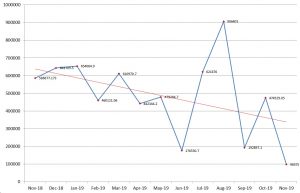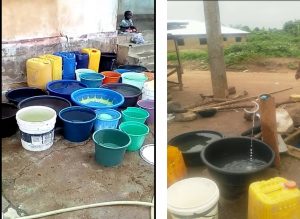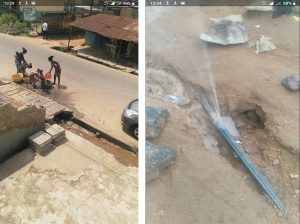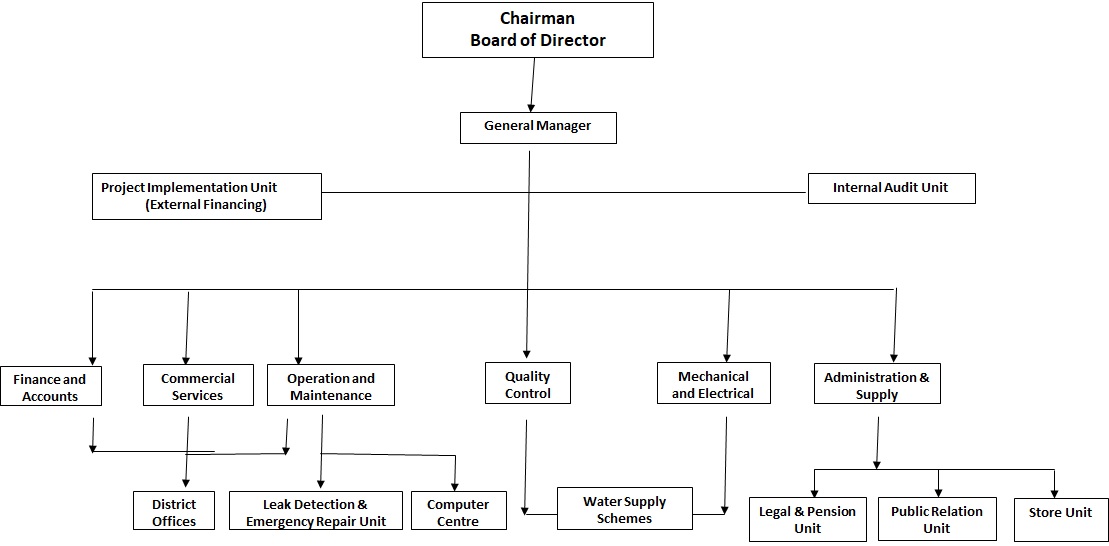The Corporation evolved out of the then Western Nigeria Water Corporation through the enabling Water Corporation of Oyo State Edict No. 24 of 1977 and as reviewed by the Water Corporation of Oyo State (Amendment) Law of 2006.
Our Vision
Our Mission
Our Objectives
The primary duties and specific objectives of the Corporation as stated in the Water Corporation of Oyo State Edict No. 24 of 1977 include the following:
- To control and manage all waterworks vested in the Corporation.
- To establish, control, manage, extend and develop new Water Schemes and to extend and develop existing ones as the Corporation may deem necessary for the purpose of providing adequate water in order to meet the requirements of the general public, agriculture, trade and industry in various parts of Oyo State.
- To ensure that water is supplied to the consumers thereof at reasonable charges and in potable quality and adequate quantity.
Overview of the Organizational Structure
WCOS has six (6) Directorates namely:
- Administration and Supplies
- Finance and Accounts,
- Operations and Maintenance,
- Quality Control,
- Mechanical and Electrical and
- Commercial Services.
The corporation also has Project Implementation Unit and Internal Audit Units which report directly to the office of the General Manager.
The Chief Executive of the Corporation is its General Manager who has the responsibility of carrying out day to day running of the Water Corporation and implementing the policies and decisions of Government. In the discharge of his duties, the general Manager is assisted by six (6) Directors as follows:
Director Operations and Maintenance responsible for the following functions:
- Supervision of the water distribution and pipe networks in the state;
- Collection of operational data for informing proposals for new schemes or extensions or existing schemes;
- Keeping up-to-date records of drawings;
- Development of new techniques and standard designs;
- Engagement of and liaison with consultants
- Responsible for monitoring of district activities.
Mechanical and Electrical Director, advises on all mechanical and electrical policy matters and handles installation, maintenance and repair of electro-mechanical equipment of the Corporation. The functions of the Directorate include:
- General supervision of the maintenance of water production facilities in the State
- Collection of operational data for advising on the proposals for new schemes or extension to existing schemes
- Power supply management
- Operation and maintenance of water schemes and booster stations
- Procurement, installation and maintenance of the electro-mechanical equipment for all Water Schemes including pump-sets, chemical dozing pumps, generators; among others
Quality Control Directorate who ensures that the water produced at the Supply Schemes in the state is wholesome and fit for human consumption in accordance with the World Health Organization and the Nigerian Standard for Drinking Water. The summary of the main functions of the Directorate is as follows:
- Water Treatment policy Formulation and Operation
- Water Analysis
- Water Quality Monitoring, Assessment and Control
- Data and Record Management
Finance and Accounts Director who is responsible for the following functions:
- Operationalization of Financial and Accounting Standards and Regulations
- Preparation and consolidation of income and expenditure of the Utility, financial statements, management information for decision making;
- Financial planning, expenditure control
- Improving the operational and financial performance of the utility.
Administration and Supplies Director responsible for the following functions:
- Personnel matters including recruitments, discipline, staff welfare and motivation;
- Facilitation of training and re-training of staff;
- Public Relations;
- Administration of legal matters;
- Transport, Storage and Distribution of supplies.
Commercial Services Director responsible for the following functions:
- Setting tariffs
- Billing
- Bill distribution
- Bill collection
- General customer management. The Director operates through 12 Districts; each district is headed by a District Manager and is further divided into sector comprising of Commercial officer, Revenue Officer and Meter readers handling commercial activities.
The Internal Audit Unit is headed by the Chief Internal Auditor who reports directly to the General Manager. The unit is responsible for the following functions :
- Prevention and detection of error and fraud
- Pre- and post- checking of all financial transactions of the Corporation
- Providing independent assurance that governance and internal processes are operating effectively.
- The Project Implementation Unit(PIU) was formed to manage external funded projects/ interventions. The main function of the PIU is to manage the projects and acts as an interface between the external agencies and the OYSG.
Water Corporation of Oyo State (WCOS) is governed by the public service conditions of employment. Staff recruitments are made upon approval by the State Government. The Staff Strength as at June 31ST , 2019 is 753.
Technical Operations are being handled under 3 Directorates headed by Director Quality Control, Director Mechanical and Electrical and Director Operations & Maintenance respectively.
The Electrical and Mechanical and Quality Control departments are responsible for Water Production , while Operations & Maintenance is responsible for Water Storage and Water Distribution within the WCOS service area.
Description of Water Production Schemes
The main sources of water supply in Ibadan are the Osun Dam on River Osun and Eleyele Dam on River Ona. These dams supply the Asejire and Eleyele water treatment plants whose combined design capacities account close to 80% of the total water production plant capacity of the state.
Within the WCOS supply area, there are other eleven (11) water supply schemes. All the schemes are fed from dams except from Iseyin (Koso & Atori) schemes where the water sources are from natural springs.
Table 1 below presents the water supply schemes, their design capacities and coverage areas.
WATER PRODUCTION OPERATION MANAGEMENT
| S/N | Water Scheme | Design Capacity (M3/Month) | % Functionality | Coverage Area | Capacity Utilization/Usage (%) | Challenges facing plant to not make it function maximally |
| 1. | Asejire I&II | 6,183,360 | 80%
| Ibadan, Ikire, Ikoyi, Apomu | 29% | Faulty filter media Frequents bursts on the distribution network due to aged pipelines. |
| 2. | Eleyele I | 557,280 | 80% | Ibadan | 25.9% | On going Flood control project is affecting abstraction of water Frequents bursts on the distribution network No access to LETMAUCK barracks reservoir |
| 3. | Oyo | 216,000 | 50% | Oyo, Ilora, Fiditi | 8.3% | Damaged Distribution Network due to Road Construction Faulty Filter Media |
| 4. | Iseyin Koso | 72,000 | 70% | Iseyin Koso | 9% | Frequent Bursts on the distribution network due to aged pipes. |
| 5 | Iseyin Atori | 72,000 | 70% | Atori | 0% | Low Voltage of Power supply Low water level for abstraction. |
| 6. | Ogbomoso | 401,700 | 70% | Ogbomoso, Ikoyi-Ile | 11% | Damaged Distribution Network due to Road construction |
| 7. | Eruwa | 54,720 | 50% | Eruwa, Igboora, Lanlate | 0% | Distribution network under repair |
| 8. | Saki | 144,000 | 50% | Saki | 0% | Aged Distribution Network |
| 9. | Igboho | 59,400 | 0% | Igboho | 0% | Needs total rehabilitation |
| 10. | Kisi | 59,400 | 10% | Kisi | 0% | Needs total rehabilitation |
| 11. | Igbetti | 75,000 | 60% | Igbetti | 0% | Aged Distribution Network. |
| 12. | Ago-Amodu | 33,800 | 50% | Ago-Amodu | 0% | Unwilling to pay for the water consumed by the community. |
| 13. | Iganna | 180,000 | 100% | Iganna | 4% | Erratic Power supply |
| 14 | Ajinapa | 36,000 | 100% | Ajinapa Tewure | 0% | Not yet connected to National grid Faulty generator |
Water Quality Management and Chemical Usage
The Water Treatment Plant/ Schemes have the sole duty of extracting raw water, treating it and distributing it to the reservoirs for supply through the distribution network to the customers as potable water and in a reliable manner.
The Water Treatment Plant (WTP) are headed by Scheme Managers who supervise plant staff including the chemists, pump operators and security guards. The number of staff in each schemes depends on the size of the plant and number of shift operated.
There is a central laboratory located at the Asejire water treatment plant which serves both the plant and the entire corporation.
Fig. 1 below shows the water production trend in cubic metre from Nov. 2018 to June 2019.
WATER PRODUCTION TRENDLINE

Water Distribution Operation Management
Water Distribution Management
Water distribution operations fall under the Directorate of Operations and Maintenance. The Directorate is however also responsible for the activities of all the personnel in the technical section in the supply of water which include district and sector distribution Officers and plumbers in all areas of WCOS operations.
Water pumped from the water schemes is boosted along the transmission mains to reservoirs by booster pumps. Whereas booster stations are the responsibility of the directorate of Mechanical &Electrical but the Operations & Maintenance has the responsibility to manage and operate the main pumping transmission mains. The distribution networks and service connections are managed by District distribution teams.
Water Distribution Network System
The WCOS water is distributed through a pipe network of about 906.5km length, covering about 42.5% of the state. The network features a number of controls including valves, hydrants, air valves and washouts.
The pipe network mains are of various material including Asbestos cement (AC), Galvanized Iron (GI), Unplasticized Polyvinyl Chloride (uPVC), Ductile Iron (DI) among others with diameters ranging from 2mm to 800mm
Although the network runs in the right of way, some of it has been buried and built on due to settlement growth and road expansions. Further, the expansion of the city and growth in settlement has not only caused damages to the pipe network but sometimes renders it inaccessible for repair.
Reservoirs
WCOS has 18 reservoirs as presented in the table below:
Table 2: Reservoirs on WCOS distribution network
| S/N | Reservoir | Number | Reservoir Type | Capacity (m3) | Location |
| 1 | Agodi | 2 | Concrete | 45,000 | Agodi |
| 2 | Basorun | 1 | Concrete | 22,500 | Basorun |
| 3 | Agodi | 1 | Underground | 4,500 | Government House |
| 4 | Letmauck Barracks | 1 | Concrete | 13,500 | Mokola |
| 5 | Oke Ado | 1 | Elevated Concrete | 400 | Ososami |
| 6 | Oke Itunu | 1 | Elevated Concrete | 400 | Oke Itunu |
| 7 | Sango | 1 | Underground | 108 | Sango |
| 8 | Oke Are | 1 | Underground | 400 | Oke Are |
| 9 | Eleyele | 1 | Elevated Concrete | 500 | Eleyele |
| 10 | Lalupon | 1 | Elevated Concrete | 1700 | Lalupon |
| 11 | Oyo | 1 | Concrete | 4,050 | Oyo (soro) |
| 12 | Iseyin | 1 | Concrete | 338 | Koso |
| 13 | Saki | 1 | Concrete | 200 | Adagba Saki |
| 14 | Kisi | 1 | Concrete | 150 | Kishi |
| 15 | Igboho | 1 | Concrete | 150 | Igboho |
| 16 | Ogbomoso | 1 | Conrete | 300 | Ogbomosho |
| 17 | Eruwa | 2 | Conrete | 200 | Withn Eruwa |
| 18 | Iganna | 1 | Elevated Braithwaite | 250 | Iganna |
The largest reservoir in the WCOS distribution network is Agodi with a capacity of 45,000cubic metre. The reservoir is served by Asejire WTP and is located in the heart of Ibadan. The reservoirs serves other reservoirs that distribute water to the major districts in Ibadan.
Boosters
WCOS has 7 boosters stations. The Boosters had bulk meters installed to help monitor pumpage volumes. The maintenance of the boosters is the responsibility of the Mechanical & Electrical Directorate.
Table 3: Boosters Station in the WCOS water distribution network
| S/N | Booster Station | Pump Capacity(m3/hr) | No of Pumps | Remark |
| 1 | Agodi | 1485 | 4 | Functioning |
| 2 | Ososami | 89.99 | 2 | Functioning |
| 3 | Bodija | 23 | 2 | Functioning |
| 4 | Bere | 89.99 | 2 | Functioning |
| 5 | Mokola | 270.05 | 2 | Functioning |
| 6 | Erunmu | 181 | 2 | Functioning |
| 7 | Sango | 83 | 2 | Functioning |
- Available Production Capacity
- Man Power to handle all production stages at the Water Works
- Competent IT and Billing Staff
- Existing Customer Base that creates High Demand for Treated Water
- Production process conform with the WHO guidelines and Nigeria standard
WEAKNESS
- Inadequate Chemical Supply
- Epileptic Power Supply
- Low Voltage power in some plants such as Saki, Ogbomoso, Eruwa
- Frequent bursts in the network leading to shut down of production
- Delayed response to leaks and bursts
- Aged dosing equipment
- Aged Infrastructure such as pumps especially in Eruwa, Saki
- Lack of Transport and tools for the field staff
- Low metering efficiency and over dependency on flat billing
- High figure of Arrears.
Several issues affecting the performance of the utility is as follows:
- Ongoing road expansion works destroyed and buried distribution network resulting into leaks and bursts and creating dry zones.
- Lack of enough repair materials in stock for attending to leakages and extension to new areas.
- Most of the schemes outside Ibadan have not been in operation for a long time due to a number of reasons that include i) dilapidated treatment plants ii) electromechanical breakdown iii) Unreliable Power Supply
- Lack of Stable Power Supply
- Illegal Connection
- Insufficient tools for the plumbers and labourers
- Unwillingness of the customer to pay for water consumed
- Old and inadequate Billing software.


| S/N | PROGRAM/PROJECT | DATE OF AWARD | NAME OF CONTRACTORS | CONTRACT SUM | PAYMENT TO DATE | STATUS | REMARKS |
| 1.0 | Construction of a 200cu.m/Hr Mini Water Supply Scheme at Owode Estate | November, 2018 | Eurobel International Limited | 840,129,215.68 | 252,038,764.70 | 65% | The project is on-going with the payment of an advance payment of 30% |
| 2.0 | Construction of a 200cu.m/Hr Mini Water Supply Scheme at Ogbooro, Oke-Ogun Area. | November, 2018 | Aremol Ventures | 840,129,215.68 | 252,038,764.70 | 40% | Ditto |
| 3.0 | Construction of a 300cu.m/Hr Mini Water Supply Scheme at Pade | November, 2018 | Roosco Resources Nig. Ltd
| 906,017,765.68 | 271,805,329.70 | 35% | Ditto |
| 4.0 | Construction of a 600cu.m/Hr Mini Water Supply Scheme at Sanusi | November, 2018 | Epignosis Nig. Ltd | 1,118,808,489.68 | 200,000,000.00 | 25% | The contractor was mobilized with 17.88% instead of 30% of the Contract sum. |
| 5.0 | Construction of a 500cu.m/Hr Mini Water Supply Scheme at Alabata | November, 2018 | Arifix Nig. Ltd | 995,936,345.18 | 150,000,000.00 | 25% | The contractor was mobilized with 15% instead of 30% of the Contract sum |
| 6.0 | Construction of a 400cu.m/Hr Mini Water Supply Scheme at Eleyele/Ologuneru. | May, 2015 | Hydro Construction and Engineering Coy Ltd | 811,519,189.00 | 643,490,899.33 | 98% | The project is 98% completed. |
| 8 | Purchase and installation of Gas power plant for Asejire and Eleyele Water Supply Schemes. Asejire: 6 MW, Eleyele: 2 MW | January,2019 | Herimark Ltd | 2,148,300,000.00 | 500,000,000 | On-going | Site clearing |
| 9 | Supply of 10,000 MT of Aluminium Sulphate | Jan 2019 | Drury Chemical Industry | 2.2 Billion | 500,000,000 | 65 Metric Tonnes supplied | On-going |
| 10 | Repair of filter bed and replacement of filter media at Oyo, Eruwa and Saki | March 2013 | KFS Ventures | 14.5 million | 4.35 million | 38% | Certificate raised but fund yet to be assessed |
Latest from us
Warning: preg_match(): Compilation failed: invalid range in character class at offset 12 in /home/oyostategov/public_html/old/wp-content/plugins/js_composer/include/classes/shortcodes/vc-basic-grid.php on line 175

